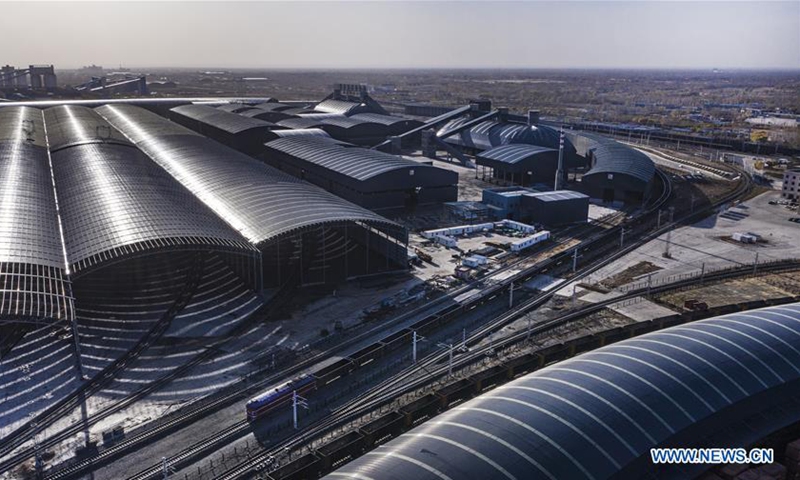
Aerial photo taken on Oct. 31, 2020 shows a freight train full of coal leaving Yulin Xiangdao International Logistics Park in Yulin City, northwest China's Shaanxi Province. Since the operation in June of 2019, Xiangdao International Logistics Park has sent 16.87 million tonnes of goods, among which 96 percent were coal. (Xinhua/Tao Ming)
Chinese magnesium producers and traders in Yulin, Northwest China's Shaanxi Province, one of the world's largest magnesium production bases that supplies more than 50 percent of global consumption, are dealing with high prices and tight liquidity, as supplies shrink and demand booms.
While many businesses have been resuming production and trading in recent weeks, hurdles and restrictions continue to limit output and could result in a 10 percent drop in exports, which could have widespread implications for many global industries amid shortages in Europe and elsewhere, industry insiders told the Global Times on Sunday.
The production suspensions in mid-September disrupted the output of most industrial facilities, including magnesium plants, which are categorized as high-emission units. While most production has resumed since early October, the tightened cashflow and high market prices of bulk commodities have kept many from trading, with some expecting an up to 10 percent drop in exports.
In the face of tight global supplies, some European industry groups, including metal producers, auto suppliers and the packaging sector, said in a joint statement on Friday that the European Commission must launch talks with China to restart shipments of magnesium to ease severe shortages and avoid plant shutdowns that could hit millions of jobs, Reuters reported.
Europe is expected to run out of magnesium stocks by the end of November, the report said.
China accounts for 85 percent of global output of magnesium metal, and the production capacity of Fugu county in Yulin accounts for 65 percent of the country's total output.
Industry insiders in the region told the Global Times on Sunday that they are facing unprecedented challenges in production and trading as market uncertainty and volatility are expected to persist until the end of the year.
While the magnesium industry is facing production restrictions, most companies have resumed operations since early October, but they're being asked to run at about 40 percent of capacity to reduce energy consumption and carbon emissions, industry insiders told the Global Times on Sunday.
About 20 magnesium companies in Fugu, which account for over half of the city's total companies, are under production constraints, with an overall monthly production capacity of about 20,000 tons. That is two-thirds of the total capacity of Yulin, an employee surnamed Chen with a local industry association in Fugu told the Global Times on Sunday.
Since output has decreased and most companies do not have adequate inventories, export volume will definitely decrease, Chen said, predicting at least a 10 percent drop compared with last year.
An employee of a company producing magnesium and related products told the Global Times on Sunday that daily operations have been disrupted by the local power pinch.
"Our production was ordered to be capped at 40 percent of the normal output," said the staffer. She noted that due to the high price of two vital production components, coal and electricity, and because demand far outstrips the company's output, the export price of magnesium has definitely surged.
Other industry insiders told the Global Times that tight liquidity caused by high market prices has become the major hurdle that stops many traders from taking orders due to risk concerns.
In China, the price of magnesium has doubled in the past year to $4,700 per ton, the highest level since 2008, according to media reports. This means that the metal has far exceeded the purchasing power of many domestic traders, the Global Times learned. A jump in coal prices also pushed up the production costs of magnesium.
"Many intermediate traders are cash-strapped and can no longer buy goods or take orders, while foreign customers do not pay in advance, resulting in all the unprecedented financial pressure being borne by traders," Yang Li, a trade manager, with a large magnesium supplier in Yulin, told the Global Times on Sunday.
Fearing potential losses due to market price changes, Yang said that the company holds only low inventories at present and sells its output as soon as possible after production, normally within three days.
The import price of magnesium in Europe has soared by 75 percent in the past month, reaching a record high of more than $9,000 per ton, according to data from Argus Media, an international energy and bulk price assessment agency. Almost half of the magnesium produced in China is exported to Europe, and a large part of it goes to Germany.
The price of magnesium is already at a high level, and there is not much room for further increases, Chen said.
Given that it takes 35-40 megawatt-hours of electricity to produce one ton of magnesium, and 16 megawatt-hours to produce one ton of aluminum, experts believe that it will be a trend for both production and trade to drop given the current global energy shortage and the high electricity consumption of magnesium production.




